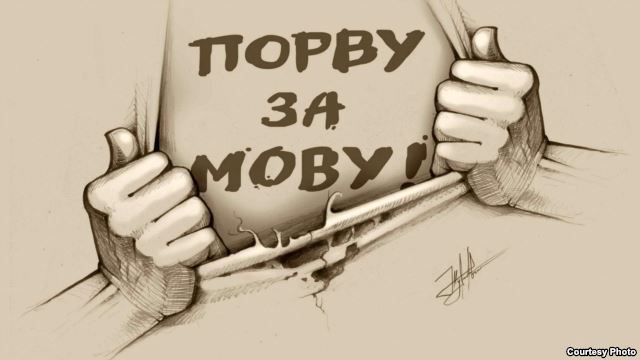1. Over the last decade, there has been a steady growth in the number of those who consider Ukrainian their mother tongue: from 57% in 2012 to 76% in 2022. The share of the Russian language has decreased from 42% to 20% over the 10 years.
Several trends should be pointed out in this dynamic. The first one is that significant changes in language self-identification took place between 2012 and 2016. One of the key reasons was
- a) the reaction of Ukrainian society to the experiments of the then government in the language policy;
- b) the events of the Revolution of Dignity; and
- c) Russia’s aggression against Ukraine in 2014 and the temporary occupation of Crimea and some territories of Donetsk and Luhansk oblast.
The second trend is that the positive dynamics in the self-identification took place due to the change in the attitudes towards the Ukrainian language in the Center, as well as in the South and East of Ukraine.
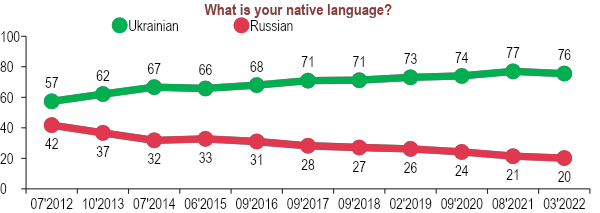
2. At the same time, the practical aspect of this issue is somewhat different: the language self-identification and the everyday language are two different areas.
We can confirm the steady decrease of the Russian-speaking segment of Ukrainians: in 2012, there were about 40% of such respondents, at the end of 2021, 26%, and at the beginning of the war, 18%. The Russian speakers instead “shift” into the segment of “bilingual speakers” (from 15% to 32%). The number of those who constantly use only Ukrainian at home has increased slightly from 44% to 48%.
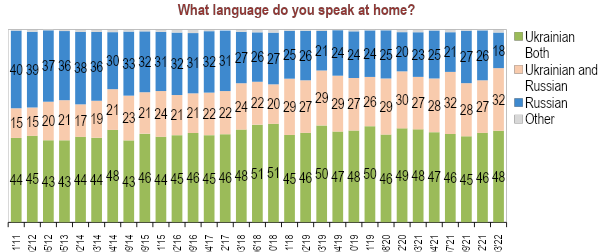
3. The transition to another language of communication is not a one-time event and requires some adaptation. What is important today is that two-thirds of those who use both Ukrainian and Russian languages in their everyday life are ready to switch exclusively to Ukrainian soon.
Among the Russian-speaking respondents, these respondents comprise one-third.
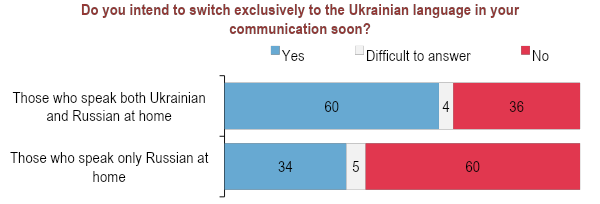
4. The unprecedented unity of Ukrainian society during the war had a dramatic impact on the attitudes to the status of the languages: today, the absolute majority (83%) support Ukrainian being the only state language in Ukraine.
The opinion of Ukrainian as the sole state language dominates in all macro-regions and in all age and language groups. On the other hand, almost a quarter of Ukrainians supported granting Russian the status of the state language before the war, and today, it is only 7%. In peacetime, residents of the South and East of Ukraine had traditionally advocated for granting Russian the status of a state language. But even in these regions, the share of such respondents was only one-third, and today this share has almost halved.
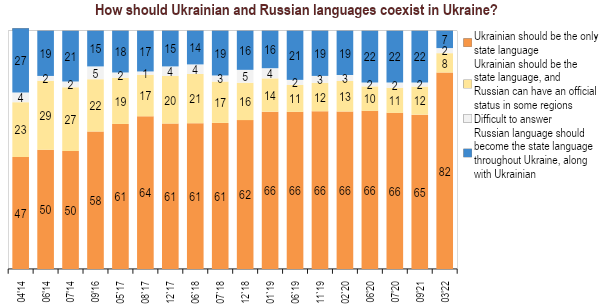
5. Today, the data suggest that language is more of a regional feature than a way of thinking.
For example, in December 2021, 65% of bilingual speakers and half of those who speak Russian considered Russia an aggressor. At the same time, in the Ukrainian-speaking segment, one in ten had pro-Russian views. The sympathy to Russia was determined not so much by the language of communication as by political views and the influence of propaganda and was associated with the support for pro-Russian parties (“The Opposition Platform — For Life”, “Nashi” and Shariy’s party).
6. Today, the majority (67%) believe that there are no issues between Ukrainian-speaking and Russian-speaking citizens of Ukraine. 19% believe that the language issue exists, but it is not that important. Only 12% believe that this issue is a threat to domestic security. It is important that the statements about the existence of the language problems are more prevalent not among the Russian-speaking population, but in the western regions, where Ukrainian dominates in all areas. Importantly, according to our previous survey, only 2% of Ukrainians believe that Russia came to protect Russian-speaking citizens of Ukraine. This myth was not accepted by Ukrainians.
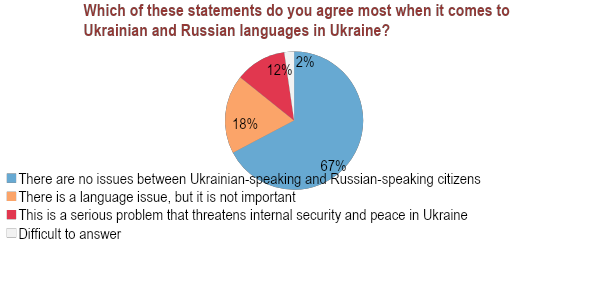
Summing up, we can make the following conclusions:
- The language self-identification of Ukrainians is growing steadily. The war, being a challenge for the whole society, will only accelerate this process. Today, the Ukrainian language is only strengthening as one of the cornerstones of Ukrainian statehood, and the lines of opposition on this issue are disappearing.
- The transition to Ukrainian in everyday life is happening in an evolutionary manner. The destruction of the myth of the “brotherly people” and the isolation of Russia from the world’s cultural and informational context will only contribute to its acceleration in Ukrainian society.
- The “language issue” and the attempts to initiate arguments around this topic are not supported by the majority of the population. This problem is purely political and partly local. Nevertheless, most citizens, regardless of their language of communication, realize that we have one common enemy: Russia, which is trying to destroy our statehood. The Russian-speaking cities of the East are the most affected by the aggressor’s actions. Ukrainian-speaking and Russian-speaking people are fighting in the Armed Forces of Ukraine, and they are united by a common goal: victory over the enemy. After the victory, we can expect continued changes in the language self-identification of the citizens and the expansion of the use of the Ukrainian language in all areas.
Related:
- More Ukrainians support military alliance with UK & Poland than NATO accession, poll shows
- Ukrainians overwhelmingly support their army and Zelenskyy, expect to defeat Russia, but want more help from West, five new polls show
- 60% of Ukrainians believe Ukraine will defeat Russia in weeks, 80% contribute to defense: poll
- 71% of Russians feel “pride, joy, respect, hope” regarding war against Ukraine – poll
- Over 80% of Ukrainians want to return occupied Crimea and Donbas; 72% in support of joining NATO – poll
- 93% of Ukrainian refugees plan to return to their home town after the war – poll


